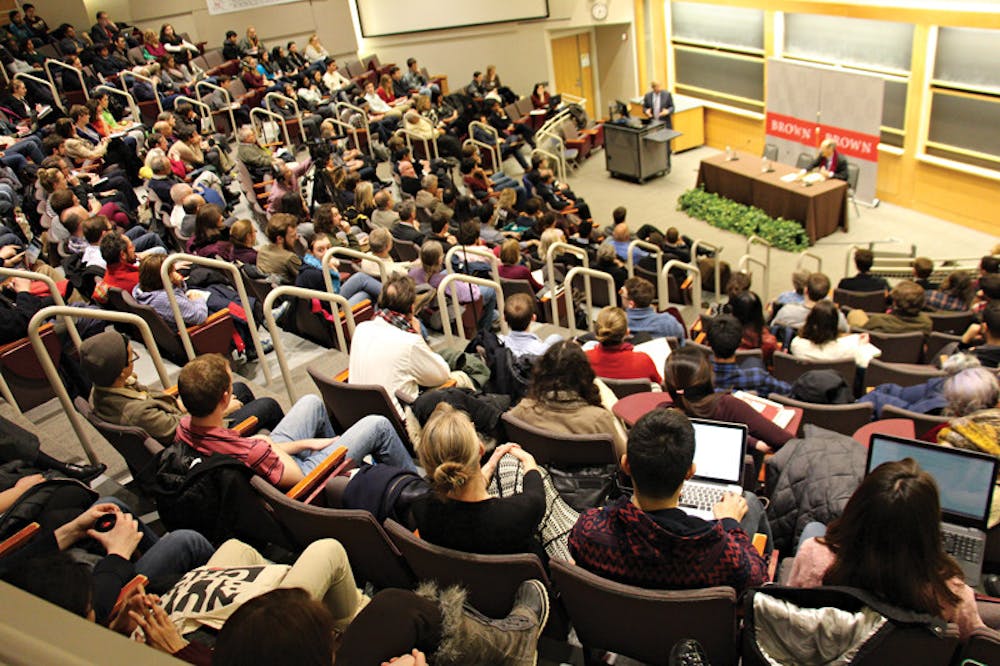Same-sex marriage is the “defining civil rights issue of the century,” said David Boies, one of the two lawyers who helped overturn Proposition 8, to a packed Starr Auditorium Thursday night.
Boies and fellow lawyer Ted Olson first came to the public’s attention during the 2000 Supreme Court case Bush v. Gore, which resolved the controversy over the vote count in the presidential election. Olson represented former President George W. Bush, while Boies represented Democratic candidate Al Gore. The duo later came together after the case closed and found common ground in fighting against Proposition 8 — the state constitutional amendment that banned same-sex marriage — in the 2012 Supreme Court Case Perry vs. Schwarzenegger.
“When Ted called me up asking if I was interested in joining him in a prosecution in trying to overturn Proposition 8, I immediately said yes,” Boies said.
At that time, people thought it was “too early” and “too dangerous” to have such a lawsuit advance to the higher courts, he said. “I believed that it was the right thing to do.”
Since Olson is a Republican and Boies is a Democrat, they were both aware their collaboration would receive a lot of attention.
“We felt that because my background had been involved in Republican politics, and I had been known as a conservative, that it would be wonderful if we could assemble a legal team of someone on the opposite of the political spectrum,” Olson said.
Boies called the progress that has been made on “a civil rights issue” substantial, adding that “none of it could have happened without decades of preparation.”
Many children in past generations did not know people with a variety of sexual orientations existed, Boies said.
“Whole new generations have grown up knowing friends, neighbors, doctors and teachers who are gay and lesbian. … So there’s nothing unusual about it,” Boies told The Herald before the event. “You didn’t get a chance to relate to them.”
Olson and Boies both proclaimed themselves firm believers in the idea that marriage is a “fundamental right” that cannot be infringed upon for any citizens.
James Morone, director of the Taubman Center for Public Policy and American Institutions and moderator of the forum, asked Olson about an instance during the trial when Justice Antonin Scalia inquired of Olson, “When did it become unconstitutional to exclude homosexual couples from marriage?” Morone cited the moment as the “core of the case.”
“There is no substitute for preparation” before going in front of the Supreme Court, Olson said, adding that lawyers must know where each justice stands on issues in order to anticipate questions. Olson and Boies, along with their team, clocked in a total of 32,000 “lawyer hours” on the case alone.
“Citizens in California have erected a wall against their gay and lesbian citizens,” Olson said, recalling his words during the trial. “You cut them off from one of the most important, fundamental rights — the right to be treated equally and the right to marry.”
“I wanted to make the point that this was a constitutional concept,” Olson said. “When the court decided Brown v. Board of Education, that’s not the moment it became unconstitutional. That’s the moment the Supreme Court recognized that it was unconstitutional.”
Boies hopes lecture attendees left with a greater understanding that same-sex marriage is a “constitutional and human rights issue,” as well as a greater sense of how the U.S. legal system works and how one can use the legal system to “promote human rights,” Boies told The Herald.
“We hope to convey some of the passion that we have for the emotions and feelings and damages that were done to our society as a result of discrimination … and how much better we can be as a society when we recognize the equality of all of our citizens,” Olson told The Herald.
Olson also encouraged students who are interested in law to further pursue the field.
“Law is an absolutely fabulous occupation,” Olson told The Herald. “You’re in a process of learning your entire life. I think that if you approach studying law not as a chore, but as an opportunity because you’re learning something about our society, how to solve problems and how to communicate with people, that’s fun.”
The event, entitled “The Constitutional Right to Marriage Equality,” was part of the first annual Steven Yee and Erich Theophile Family Lecture series.





